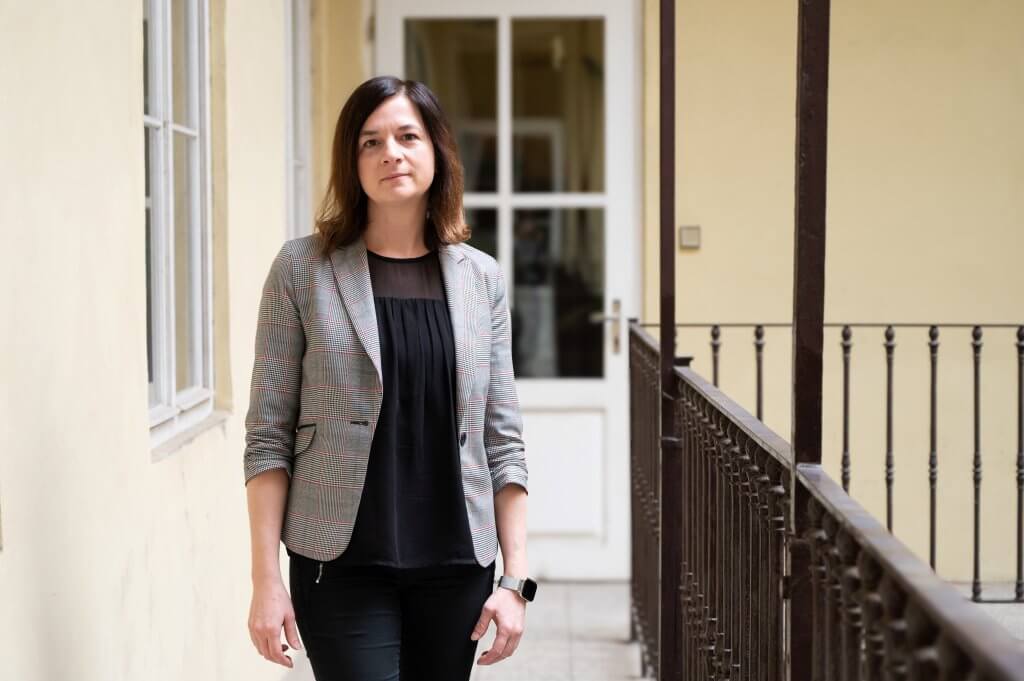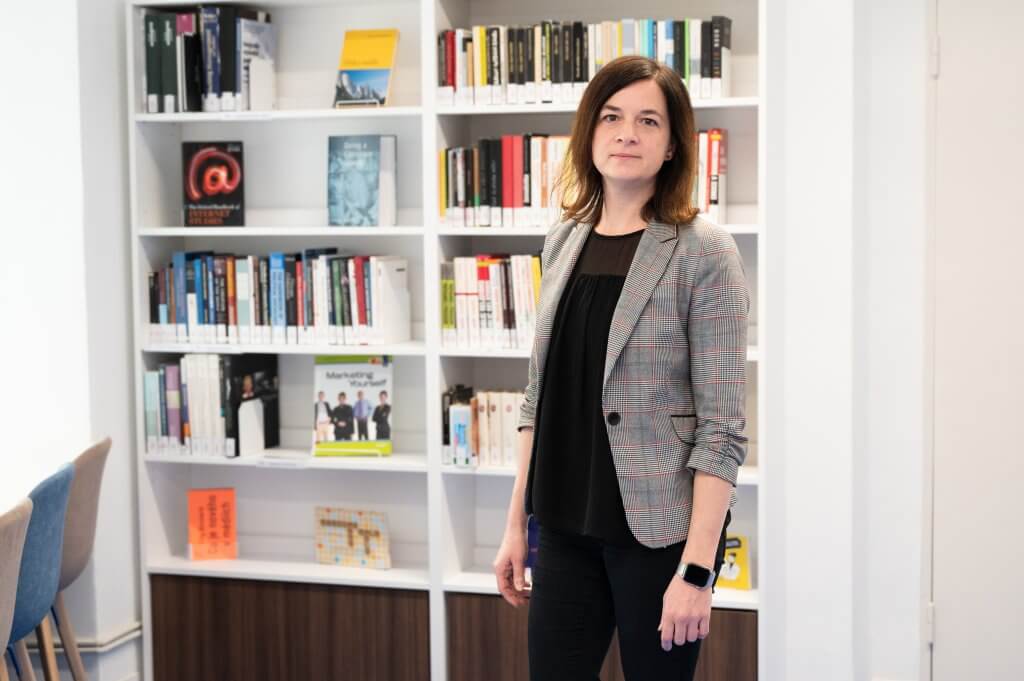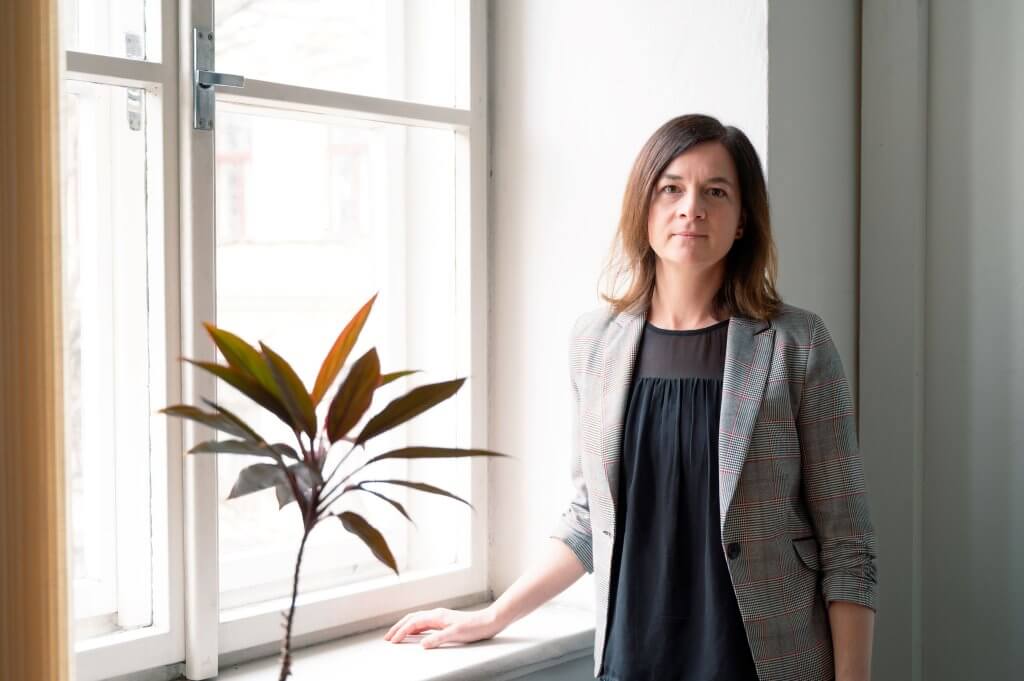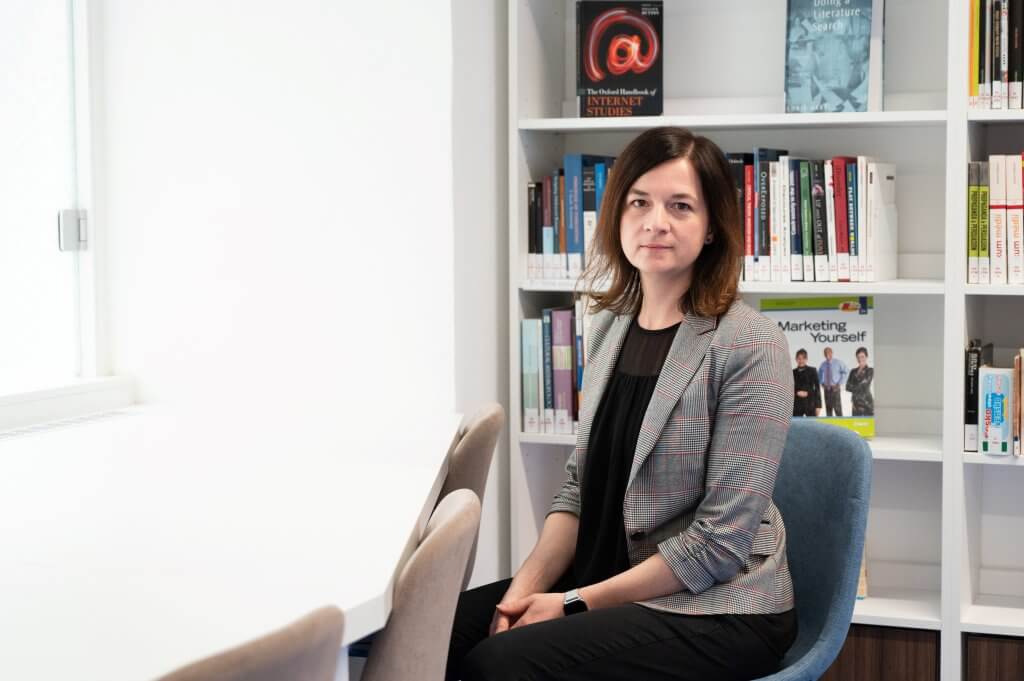“I am interested in how the media contributes to widening the gap in the attitudes of young women and men towards gender issues,” says ICSJ researcher

Lenka Vochocová from the Institute of Communication Studies and Journalism was inspired for her research topics, among other things, by working in the media and non-profit sector. In her research, she deals with the role of gender in Czech journalism, online political participation and the spread of disinformation in the digital environment. One of her goals is to help people think more about the fact that the words they write or speak can hurt others more than they would like or realize.
Vochocová has been associated with FSV UK since the beginning of her university studies. She completed her bachelor’s degree in journalism and then her master’s and PhD studies in media studies at the ICSJ. However, at the beginning of her working career, she first ventured outside the academic field. After several years as a journalist at Czech Television, she moved to the non-profit sector, which became her main area of interest for a long time – she worked in the media programs of People in Need, in several gender-focused non-profit organizations, and volunteered with people with intellectual disabilities. “Then I founded my own organization, Inventura, which was dedicated to creative work with this target group – we became known mainly thanks to the documentary work of our creators with disabilities,” she says.
The journalistic environment and the topic of disadvantaged groups and their representation ultimately inspired her in her research career. In her dissertation, she dealt with the topic of gender in the professional discourse of Czech journalists. “I am a supporter of a sociocentric view of the media, i.e. one that sees them as institutions influenced by general social relations. And the position of women is still not good, on the contrary, we are now seeing increasing misogyny in many different contexts and its normalization in the public sphere,” she emphasizes. “Even from the student projects that I supervise, it is clear that female journalists are the target of symbolic gender-based violence. And we hear this from the female journalists themselves who publicly address this issue,” she adds.
A significant scientific impulse for her in 2013 was the establishment of the PolCoRe research group at the ICSJ, thanks to which she came to the topic of online political participation, or more precisely, online expressivity, which she has been working on to this day. Over the past ten years, she has researched how users of digital media participate in constructing public debate on many different topics – for example, in the context of pre-election discussions, the so-called European migration crisis, the Covid-19 pandemic, or the war in Ukraine.

She also addressed this area in the collective monograph At sea, behind the fence, on the web. Digital media and the debate on migration in Czechia, which was published in 2021 by the Kniha Zlín publishing house. She contributed a total of five chapters to it, four of which she collaborated with Jana Rosenfeldová, also from the ICSJ. Vochocová analyzed the relationship between the media framing of the migration crisis and the form of user comments on such articles, the polarization of discussants in relation to this topic, and the gender aspects of the migration discourse. “I also examined how racism, xenophobia, and sexism directed against European women intersect in user comments,” she adds. “It was very interesting for us to observe how certain ‘persistent images in our heads’, as we called one chapter, become established – that is, how migration becomes a topic that people associate even with articles that are not related to migration (for example, a report on the quality of chocolate in the Czech Republic or the most common surname). This is a phenomenon that we also observe in other crises,” she notes.
Since 2025, she has been researching digital media as part of the project Gender aspects of disinformation dissemination and reception from the perspective of the theory of social media performativity and identity theory, which was supported by the Czech Science Foundation (GACR). As the main researcher, she and her team map the users spreading gender disinformation and so-called anti-gender narratives. “In addition to clear-cut misinformation, we are also interested in people and institutions spreading hatred towards women or LGBTQ+ people, attacks on so-called gender ideology and feminism, but also profiles that emphasize the gendered identities of women and men – it could be a man advising others on how to be ‘real men’, or a woman advising women on how to be properly feminine,” she explains. “We are interested in this topic mainly because it shows that there seems to be a global gap in the attitudes of young women and men towards gender issues – while women are on average more liberal than, for example, their mothers or grandmothers, men are becoming more conservative than previous generations of men,” she adds.
However, they do not want to stop at just mapping ‘anti-gender’ narratives and the networks of their spreaders – they would also like to explore what the consumption of such content brings to its recipients and why people join in spreading gender-based hatred in the online environment. “And here we lean towards theories that explain that these are actually certain performative acts serving to build a sense of belonging to a certain online community, in which a person is recognized by, for example, rejecting trans people or emancipated women. This allows them to belong somewhere and gives them a sense of security that they may lack in other areas of life,” she adds.
Journalistic environment
In parallel with this, she does not abandon her interest in the journalistic profession in her research. As part of her work at the The National Institute for Research on the Socioeconomic Impact of Diseases and Systemic Risks (SYRI), she is currently investigating the relationship between societal crises and journalism. She is currently specifically focusing on how the so-called solutions journalism, or journalism focused on solutions. She was prompted to this topic mainly by foreign literature, which agrees that this type of journalism has a very positive effect on recipients in times of serious social crises and partial crisis events, giving them hope and alleviating their feelings of uncertainty, stress and general devastation.

“However, in the Czech Republic (and not only here), from the perspective of journalists themselves, the economic principles of how the media works and the enormous pace of media production stand in the way – according to my sources, writing a solutions article takes at least three days, which means that during that time journalists cannot produce the usual one article a day, sometimes even more, as well as the lack of interest of recipients (such articles are said to not be clicked on enough because they are not sensational enough), but also the prevailing ideas about what proper reporting looks like,” she describes. “My data showed that crises are perceived more as an obstacle to the spread of the solutions approach, because they will draw all the attention of the editorial staff and increase the work pace and stress. At the same time, however, solutions articles are very meaningful for journalists, they give them new impulses and a sense of fulfillment from their work, and they can be perceived as prestigious,” she adds.
In addition to the activities already mentioned, in recent years she has also been involved as a researcher in two projects that dealt with research into the public representation of young political actors. These were the projects of Markéta Supa from ICSJ, supported by the the Czech Science Foundation (GACR), and Dr. Annamária Neag from ICSJ, which was part of the Charles University Primus program. “It was relatively positive to see that, with some exceptions (conservative media), active young people have a lot of support in the media. In online user discussions, it was even worse and sometimes for me, as a mother of two children, slowly growing up, it was very sad to read about what people are able to write publicly on the Internet in relation to children and young people,” she emphasizes. “In addition, the principles of exclusion were very similar to the ways of excluding women or ethnic and racial minorities, and I saw in them again the interweaving of various hateful attitudes: transphobia, sexism, xenophobia or ableism,” she adds.
International cooperation plays an increasingly important role in her research activities. For example, she is currently part of the COST project called OPINION, which is led by Christian Baden from the Hebrew University of Jerusalem. “We are focusing on the theoretical and methodological possibilities of machine measurement and analysis of opinions and attitudes and we are establishing various partial cooperations, I am enjoying it very much,” she describes. She is also recently involved in Claudia Mellado’s JRP Project (Journalistic Role Performance Project), which monitors the changes in the journalism profession on a global scale, together with Michal Tkaczyk from Masaryk University. “There will be a third wave of data collection, so I am looking forward to the Czech Republic finally being represented in it. We will have access to comparative data and further international cooperation, which is great,” she describes.

Wishes for “slow” science
In general, what she finds most fulfilling about her career as a scientist is discovering different perspectives, connections and patterns in the world around us. “I enjoy meeting inspiring people and seeing that we often ask ourselves similar questions, across different cultural experiences. I enjoy talking to students and getting to know the topics and issues that are important to them. I think that contact with thoughtful young people can help you stay mentally younger and more open,” she says. “I would like scientific work to continue to entertain and fulfill me, and that we (as an international community) would perhaps, thanks to interdisciplinary cooperation, be able to better understand phenomena that we describe in a rather partial way today and that often leave us speechless,” she adds.
She would also like to contribute to people thinking more about the fact that written or spoken words can hurt others more than they would like or realize, and if at least some of them were able to reflect on what actually leads to such publicly expressed hatred or disparagement of others. “That it is often not their thoughts or beliefs, but some culturally prescribed and symbolically disseminated patterns that they have adopted, among other things, through media consumption,” she adds.
On the other hand, what she finds demotivating in her scientific career is the increasing competition between institutions and individuals and the scientometric view of research work. “I find it completely outrageous to despise the work of a colleague because their article was published ‘only’ in the third or fourth quartile of the Web of Science or even completely outside this database. It is as if we have forgotten that relatively recently, here in the Czech Republic, for example, we had almost no such outputs in such journals in our field, but it is as if we also refuse to see the context of such a measurement of our results,” she emphasizes, noting at the same time that publishing in the most prestigious journals is often increasingly difficult due to the overproduction of scientific outputs. “But I try not to succumb to such things, because for many people the system is demotivating and frustrating. It would be great if we could do much ‘slower’ science based on much more collaboration and less competition than we are forced to do now,” she concludes.


